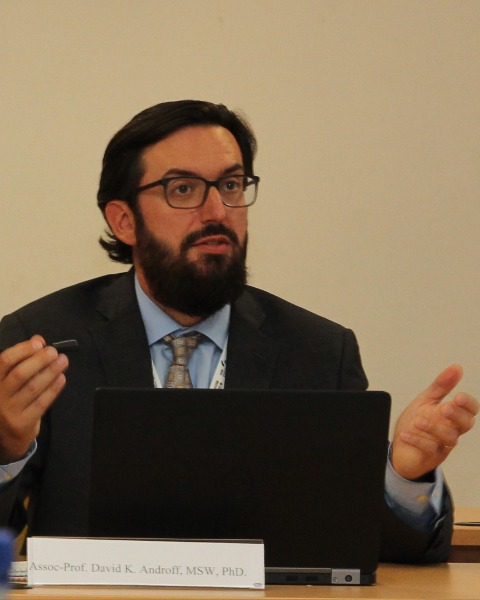Back
Values and Ethics
Interdisciplinary Teams and Ethics
Value Conflicts and Ethical Dilemmas in Interdisciplinary Law and Social Work Teams
Friday, November 11, 2022
7:45 AM – 8:15 AM
Location: Huntington C

Cherra Mathis, MSW
Graduate Research Associate
Arizona State University
Phoenix, Arizona, United States
David Androff, PhD, MSW
Associate Professor
Arizona State University
PHOENIX, Arizona, United States
Author and Presenter(s)
Contributor(s)
Overview: This study examines ethical dilemmas in a legal aid organization providing services to detained migrants. Focus groups with social workers, attorneys, and leadership (n=26) provide insight into conflicting discipline-specific ethical guidelines, shared pressure of combatting state-sponsored violence against immigrants, and stress of expanded client need from crimmigratory policies and Covid-19.Proposal text: Together, social work and law teams enable holistic approaches to the human rights of immigrants (Androff & Mathis, 2021). However, each discipline’s Code of Ethics can leave them in conflict (Galowitz, 1999; Smith, 1970). Social work and legal advocacy teams confront entrenched racist and xenophobic systems that criminalize immigrants (Abrego et al, 2018; Jones, 2021). These teams have an ethical imperative to support and safeguard the human rights of those fleeing danger, who are further harmed by US immigration proceedings (Ardalan, 2015). The Covid-19 global pandemic amplifies harsh immigration policies and the risks to migrants (Refugees International, 2021).
This study examines ethical dilemmas encountered by social workers in collaboration with attorneys providing legal and social services to detained migrants. It also explores how this advocacy is confounded and undermined by the systemic violence of immigration proceedings, conflicting with values of human dignity and justice, and how the global pandemic strains professional capacity to meet ethical obligations to migrant safety and wellbeing.
Participants are staff (n=27) at a pro-bono legal aid organization in the Southwestern U.S., representing children and adults in immigration proceedings. Twelve social workers, 9 legal professionals, and 6 administrative and management staff participated in 5 discipline-specific focus groups via Zoom. These were recorded and transcribed and checked for accuracy. Codes were developed from the interview prompts, with inductive themes emerging from hermeneutical analysis. Findings were triangulated between the transcripts from legal professionals, social workers, and administrators to refine the themes.
Findings highlighted conflicts between the ethical obligations of lawyers and social workers, such as mandatory reporting for child endangerment and duty-to-warn, confidentiality, and the limitations of each profession’s differing relationships to their shared client such as best interest vs expressed interest roles. These inter-professional tensions were addressed through shared commitment to the organization’s mission of holistic advocacy. Findings also illustrated how teams of lawyers and social workers engaged with shared ethical obligations to fight dehumanization and confront state-sponsored violence against migrants. Together, lawyers and social workers identified how the dual impact of the criminalization of migrants, and the global pandemic on migrants in detention and at the border, intensified their ethical obligation for zealous advocacy.
Implications include the importance of clear ethical guidelines and pre-existing protocols for interdisciplinary work. Another is the value of legal and social work collaboration in facing the challenges and defeats when confronting adversarial legal systems. These findings implicate the systemic factors increasing life-or-death stakes of legal advocacy, emphasizing the necessity of shared ethical mandates to protect the safety and dignity of immigrants. Future research should address how practitioners fulfill their ethical obligations to justice and human rights within harmful systems, and during times of global crisis, using their roles to address client needs and ethical dilemmas at the macro level in confronting violent state and legal structures. Social work and legal education should explore collaborative models for differing professionals, and identify how to center shared ethics and build on the strengths of each profession’s codes.
This study examines ethical dilemmas encountered by social workers in collaboration with attorneys providing legal and social services to detained migrants. It also explores how this advocacy is confounded and undermined by the systemic violence of immigration proceedings, conflicting with values of human dignity and justice, and how the global pandemic strains professional capacity to meet ethical obligations to migrant safety and wellbeing.
Participants are staff (n=27) at a pro-bono legal aid organization in the Southwestern U.S., representing children and adults in immigration proceedings. Twelve social workers, 9 legal professionals, and 6 administrative and management staff participated in 5 discipline-specific focus groups via Zoom. These were recorded and transcribed and checked for accuracy. Codes were developed from the interview prompts, with inductive themes emerging from hermeneutical analysis. Findings were triangulated between the transcripts from legal professionals, social workers, and administrators to refine the themes.
Findings highlighted conflicts between the ethical obligations of lawyers and social workers, such as mandatory reporting for child endangerment and duty-to-warn, confidentiality, and the limitations of each profession’s differing relationships to their shared client such as best interest vs expressed interest roles. These inter-professional tensions were addressed through shared commitment to the organization’s mission of holistic advocacy. Findings also illustrated how teams of lawyers and social workers engaged with shared ethical obligations to fight dehumanization and confront state-sponsored violence against migrants. Together, lawyers and social workers identified how the dual impact of the criminalization of migrants, and the global pandemic on migrants in detention and at the border, intensified their ethical obligation for zealous advocacy.
Implications include the importance of clear ethical guidelines and pre-existing protocols for interdisciplinary work. Another is the value of legal and social work collaboration in facing the challenges and defeats when confronting adversarial legal systems. These findings implicate the systemic factors increasing life-or-death stakes of legal advocacy, emphasizing the necessity of shared ethical mandates to protect the safety and dignity of immigrants. Future research should address how practitioners fulfill their ethical obligations to justice and human rights within harmful systems, and during times of global crisis, using their roles to address client needs and ethical dilemmas at the macro level in confronting violent state and legal structures. Social work and legal education should explore collaborative models for differing professionals, and identify how to center shared ethics and build on the strengths of each profession’s codes.
Learning Objectives:
- Participants will understand value conflicts and ethical dilemmas between lawyers and social workers in interdisciplinary advocacy work for clients in immigration enforcement proceedings
- Participants will identify tensions and conflicts encountered and addressed together by interdisciplinary teams as part of their advocacy in immigration court and detention
- Participants will understand how the pandemic and increasingly harsh immigration policies raises the ethical stakes and exacerbates stressors for law and social work teams representing detained migrants
